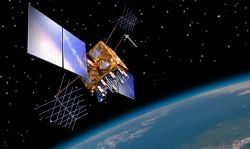 Satellite is a body that accompanies or revolves around another, observed mainly in the field of astronomy, be it artificial or natural.
Satellite is a body that accompanies or revolves around another, observed mainly in the field of astronomy, be it artificial or natural.
From the point of view of astronomy, a satellite would be anything that orbits something larger, from a dwarf planet to entire galaxies (which orbit larger and stronger galaxies).
In the field of astronautics - a science that develops machines that occupy the Earth's atmosphere and space -, satellites are objects built by man and that serve to map the surface of the Earth (taking photographs of the planet's geography, for example), in addition to transmitting information to all corners of the world and the Universe.
know more about Astronomy.
The word satellite can still be used as an analogy to the individual who intensely follows and admires another person, thus being constantly around him. Thus, starting from this same interpretation, a satellite can also refer to anything that depends on another, such as structures, cities, countries and so on.
Natural Satellite and Artificial Satellite
In astronomical studies, natural satellites are celestial bodies that gravitate around another one of greater size and gravitational force, forming a set of a main and a secondary planet.
THE Moon, for example, is the Earth's natural satellite. The presence of several natural satellites gravitating around a planet is common, as can be seen in the Solar System.
Read about the meaning of moon phases.
Artificial satellites, as said, are structures built by humans and usually in orbit around planets.
Among the various functions of artificial satellites is the transmission and collection of information. Currently, radio, television, internet and telephone signals, for example, are transmitted through satellites that orbit the Earth.
See also the meaning of remote sensing.
The GPS (Global Positioning System) is an example of a technology that needs the information transmitted by satellites to work properly.
Learn more about GPS and atmosphere layers.

